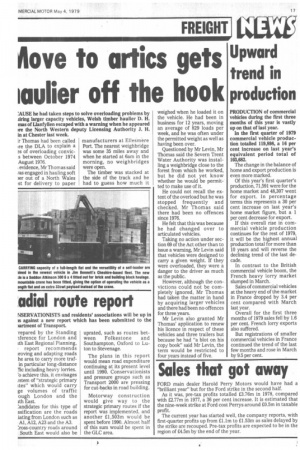love to arks gets 'Wier off the hook
Page 19

If you've noticed an error in this article please click here to report it so we can fix it.
:AUSE he had taken steps to solve overloading problems by tiring larger capacity vehicles, Welsh timber haulier D. H. mas of Llanfyllen escaped with a warning when he appeared ire the North Western deputy Licensing Authority J. H. in at Chester last week.
fr Thomas had been called ■ re the DLA to explain a as of overloading convics between October 1974 August 1976.
evidence, Mr Thomas said Tas engaged in hauling soft ier out of a North Wales .st for delivery to paper manufacturers at Ellesmere Port. The nearest weighbridge was some 35 miles away and when he started at 6am in the morning, no weighbridges were open.
The timber was stacked at the side of the track and he had to guess how much it weighed when he loaded it on the vehicle. He had been in business for 12 years, moving an average of 829 loads per week, and he was often under the permitted weight as well as having been over.
Questioned by Mr Levin, Mr Thomas said the Severn Trent Water Authority was installing a weighbridge close to the forest from which he worked, but he did not yet know whether he would be permitted to make use of it.
He could not recall the extent of the overload but he was stopped frequently and checked. Mr Thomas said there had been no offences since 1976.
He felt that this was because he had changed over to articulated vehicles.
Taking no action under section 69 of the Act other than to issue a warning, Mr Levin said that vehicles were designed to carry a given weight. If they were overloaded, they were a danger to the driver as much as the public.
However, although the convictions could not be completely ignored, Mr Thomas had taken the matter in hand by acquiring larger vehicles and there had been no offences for three years.
Mr Levin also granted Mr Thomas' application to renew his licence in respect of these vehicles and three trailers but because he had "a blot on his copy book" said Mr Levin, the term would be restricted to four years instead of five.
























































































































